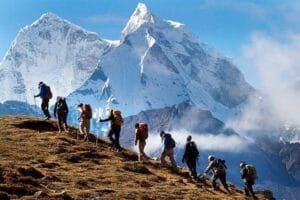Chandigarh, April 10 – At a time when modern life is marked by screen fatigue, urban congestion, and mental burnout, trekking is emerging not just as an outdoor activity—but as a life practice that rejuvenates the body, sharpens the mind, and reawakens a sense of purpose.
Experts and trekkers alike are now urging people to embrace trekking as more than an occasional adventure, advocating for it to become a regular part of life.
“Trekking teaches resilience. You don’t just climb mountains—you climb parts of yourself,” said Dr. Sameer Kohli, a psychologist who regularly leads weekend treks in Himachal Pradesh. “It helps recalibrate your mental balance, something city life constantly disrupts.”
A Mental Detox That Doesn’t Need WiFi
Trekking requires one to unplug—literally. With no mobile network in dense forests or high-altitude zones, people are compelled to disconnect from their devices and reconnect with their senses. For many, this becomes a form of therapy.

A 2023 study by the Indian Institute of Psychological Research found that individuals who went on monthly treks reported a 33% reduction in symptoms of anxiety and a 27% drop in depressive tendencies. “Walking in silence amidst trees or across ridges gives you a perspective that therapy rooms often strive for,” noted Dr. Kohli.
A Return to Physical Vitality
Modern lifestyles have dulled the human body’s primal instincts and endurance. Trekking reverses that erosion. It activates major muscle groups, improves cardiovascular health, and enhances joint mobility. What makes it more effective than a gym is its unpredictability—steep slopes, changing weather, and natural obstacles force the body to adapt continuously.
“Trekking gave me strength, but it also gave me respect for my body,” said 28-year-old Poonam Rawat, who now volunteers as a guide for first-time trekkers in Uttarakhand. “Each trek reminded me how capable I actually am.”
According to data from the Trekking and Mountaineering Federation of India (TMFI), participation in trekking expeditions has surged by over 60% in the past five years, especially among young professionals in the 25–40 age group. The growing interest signals a shift toward fitness routines that offer more than calorie burns.
A Classroom Without Walls
Beyond physical and emotional health, trekking serves as a powerful educator. Trekkers learn firsthand about geography, climate patterns, flora, fauna, and indigenous cultures. The journey transforms into a form of immersive learning—especially for young people.
“The mountains teach humility,” said Anwar Hussain, a retired army officer turned trek mentor in Kashmir. “Nature doesn’t bend for you. You have to work with it, respect its pace, and move accordingly.”
School programs are slowly catching up to this idea. Several institutions across India have introduced “eco treks” into their extracurricular models, combining environmental awareness with experiential learning.
Building Communities Through Shared Struggles
Trekking often forges connections that outlast the trail. The shared hardship of climbing together—exhaustion, cold nights, tight campsites—has a way of breaking down barriers. Whether it’s a CEO and a student sharing a flask of chai or strangers offering moral support mid-climb, trekking dissolves hierarchies.
“You’re stripped of status out there. Everyone is equal before the mountain,” said Hussain.
This sense of community continues beyond the journey, with many forming volunteer groups, supporting local economies, and raising awareness about conservation.
A Deeply Local Footprint
Trekking not only benefits the individual—it also strengthens local economies. Homestays, porters, guides, cooks, and artisans rely heavily on responsible trekking tourism. In regions like Himachal, Uttarakhand, and the Northeast, it’s often the primary source of livelihood.
“Trekking has revived hope in our village,” said Meena Negi, a resident of Kanatal, Uttarakhand. “Earlier, people were migrating. Now, youth are staying back to become guides, host trekkers, and run small eco-lodges.”
A Practice for Life
Ultimately, trekking is not about reaching a summit—it’s about the process. It teaches patience, pushes limits, and forces reflection. Every step is a reminder that growth comes slowly, through effort and humility.
As Kohli puts it: “Trekking should not be viewed as a holiday. It should be seen as a necessity, like reading, walking, or resting. It’s a practice for life.”


